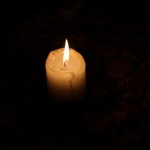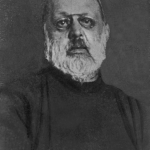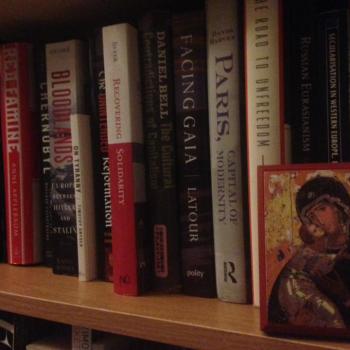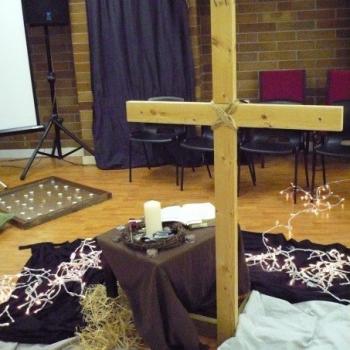![Roses' Garden at UCA, El Salvador. The place where : Ignacio Ellacuría, Ignacio Martín-Baró, Segundo Montes, Juan Ramón Moreno, Amando López, Joaquín López y López, Elba Ramos y Celina Ramos, were killed at november 16th 1989, by a military pelotoon - by Johan Bergström-Allen - Archbishop Romero Trust (Mártires_de_la_UCA_-_2.jpg) (CC BY 2.0 [https://creativecommons.org/licenses/by/2.0/deed.en]), via Flickr](https://wp-media.patheos.com/blogs/sites/721/2016/11/Ma%CC%81rtires_de_la_UCA_-_2-1024x680.jpg)
My spiritual father is a Byzantine Jesuit. After discerning that this was actually a question, he proceeded to help me discern.
He told me that I don’t exactly have an obligation to say anything. I told him I was perplexed. After all, I’m supposed to be a public intellectual of sorts. I teach a course on Comparative Minority Conservatisms at Northwestern. Part of my research is on Asian American conservative ideologies. I even give interviews to the press on such things from time to time.
He asked me whether I felt called by the Holy Spirit to say something. I told him that I had nothing to say. I had even prayed Fr Lawrence Farley’s Akathist to Jesus Light to Those in Darkness earlier in the afternoon in preparation for the election outcomes. I had figured at the time that perhaps this very rich hymn might give me something to say. But as the results rolled in for Trump, I felt that anything I’d have to say would be construed as opportunistic, instrumentalizing prayer for inauthentic writing. In response, my spiritual father pointed out that that would indeed be a problem because everything I write is, in his words, ‘hyper-authentic.’ I mused to myself that that is perhaps all too true even of my academic writing, unfortunately.
But don’t I have a moral obligation as a public intellectual to say something? I asked my spiritual father. He asked me what I had to say. I said that I had nothing to say. He said that if I felt that I needed to say something, I could possibly say that I have nothing to say. Silence versus spin, he said, is a witness against the spin of the pundits.
That’s when I put up this candle on my blog late Tuesday night.
My spiritual father then gave me several online gifts. He asked me whether I was struggling with speaking as a Christian scholar. I said that I wanted to think about this just as a scholar, thank you. He said that he wouldn’t be able to help me with that if I wanted to pursue pure secular academic advancement, but if I wanted to be Christian about being a public intellectual, I could possibly read some of the Jesuit documents reflecting on the experiences of the Universidad Centroamerica José Simeon Cañas (UCA) and the 1989 martyrdom of their president Ignacio Ellacuría SJ, along with along with five other Jesuits, their housekeeper, and her daughter.
I spent much of the night after I posted the candle reading through these documents: The Jesuit University in a Broken World, a special document on ‘The Promotion of Justice in the Universities in the Society,’ Fr Ellacuría’s speech at Santa Clara University seven years before he was martyred.
The question my spiritual father put to me through these documents was: was I willing as a scholar to fully align with the option for the poor in this moment? A truly Catholic scholar, these documents argue, is not interested in only advancing one’s career aims through self-interested scholarship or in defending a sort of Catholic politics of identity; what it means to be Catholic is to do justice, to reflect on an actual situation of oppression, and to be aligned in scholarship with the oppressed by doing work alongside and for the poor. The university, the documents contend, needs to be an agent of transformation within the community in which it is located.
But who is the poor? And what is a situation of poverty? As the election results rolled out and over the next day, voices claiming to speak for the poor and assessing the situation of poverty and oppression also began to roll out. Blame circulated like wildfire, and I agree with some of the blame to go around – the Democratic National Convention’s favouritism of Hillary over Bernie, the smugness of the Left toward those it had called ‘deplorables,’ the 81% of white evangelicals and 53% of Catholics who had voted for Trump. Third-party voters also were to blame, although the actual number of votes they took away seems debatable at this point, and so were privileged minorities. People of color, queer people, and women recounted stories of open racism, misogyny, homophobia, and transphobia, and in case anyone wants to see the list of grievances, it’s available on Shaun King’s twitter feed. In my current home city of Chicago, a protest broke out about such racism; in Oakland and Seattle – which are cities that I have learned to call home some of the time – there was some violence too.
Sólo le pido a Dios, que el dolor no me sea indiferente, I had posted the night before; these are Leon Gieco’s words, made famous by Mercedes Sosa’s rendition. ‘I only ask of God, that I am not indifferent to the pain…’
I do not speak Spanish with any competency (nor do I read or speak Portuguese either, despite my affinity for the Brazilian educator Paulo Freire), but I thought of this song while I was reading the UCA documents. As with Freire’s Pedagogy of the Oppressed, they outline two necessarily simultaneous approach to a situation like ours. One is an objective view, to be able to articulate what is the current material situation and the ideological fantasy-structure that allows it to exist, to be able to speak objectively about who are the poor, who are the oppressed, and what are the conditions of their poverty and oppression.
I have a very particular view of this objective reality that I discussed via Ivanka Trump’s speech at the Republican National Convention back in July. In brief, I think what has been allowed to happen in an objective way is not simply the election of Donald Trump, but the approval of a corporate merger between the Trump Organization and the United States of America – one that is not only riddled with conflicts of interest (as the Washington Post outlines), but is the vulgar revelation of what the Italian theorist Giorgio Agamben calls totalitarian liberal democratic capitalism (which is the real point of the Homo Sacer series, I propose) and what the Slovenian philosopher Slavoj Žižek terms capitalism with Asian values, which as he notes has nothing to do with Asian people and everything to do with how ‘the marriage between capitalism and democracy is over.’ Here, I might note that I realize that Žižek oddly said that he have voted for Trump if he could have, the oddity being that Trump represents (as I suggested in my assessment of ‘Chinese evangelical Trumplicans’ in Vancouver) precisely the capitalism with Asian values against which Žižek posits a ‘leftist plea for Eurocentrism,’ most notably in his support (unlike most of the Left) for the Euromaidan protests in Ukraine in 2013-4. I think Žižek might have been saying that too in a more provocative way, and it bears noting that after everyone wrote him off after what seemed to be his endorsement of Trump, many of the analyses of the Trump phenomenon and its relationship with Brexit and the rise of Marine Le Pen in France sound an awful lot like Žižek’s leftist plea for Eurocentrism over against capitalism with Asian values.
In other words, I have fairly strong theoretical views about what I think is objectively going on in the election of Trump, and I happen to agree with those who think that a stronger class-based materialist analysis of how the elections broke down will be important in thinking about how to protest the new American regime, especially in dialogical communion with the poor, as Freire would say. In fact, my reading of these Latin American documents is beginning to convince me that what comes around goes around; if the United States has for over the last half century installed dictators friendly to American interests on that side of the hemisphere (including in the record of Clintonian policy), our imperialism over there (as Hannah Arendt would suggest) is perhaps coming back to become our totalitarianism here, although as Agamben pointed out all the way back in his first Homo Sacer book, this ‘totalitarian liberal democratic capitalism’ is going to be subtle, unobvious, not pinned down on one person, and therefore all the more dangerous.
But if I only ask of God that I am not indifferent to the pain, then there is a subjective dimension that I need to take into account as well. I am a person of color, I work among people of color, my family is composed of persons of color, I teach on communities of color, and I am actively following Shaun King’s record of violence against people of color in light of the election. I do think that a descent into the politics of identity for people of color in this moment distracts from the materialist analysis that is needed, but I am not only not indifferent to the pain of people of color; I am in pain because my body is marked with color.
I spent the evening after the election hanging out with Asian American evangelical students, who had planned to have an alumni career night well before the elections happened. I went because they were serving free Chipotle. The pain there was real, too, even if they were not talking about the Trump Organization’s corporate merger with the United States and the advent of a vulgar totalitarian capitalism. The discussions were in fact hardly about the elections – much of the conversation revolved around what to do in post-college life, with personal budgeting, financial literacy, overcoming loneliness, navigating one’s way through a white corporation as an Asian American – but the weight of the election hung over the entire event: I will never forget how one student leader opened in prayer with reference to the elections and proceeded to quietly sob her way through Psalm 38.
Sólo le pido a Dios. The students asked me to pray with them, and while I disagree with a purely subjective identitarian reaction to the Trump phenomenon, prayer is a mode of communication where I have learned that the subjective dimension matters a lot to G-d who is articulating the groaning of our hearts. Indeed, as we prayed, what emerged from my lips were two prayers to the Holy Spirit. One was the Latin one: Come, Holy Spirit, fill the hearts of your faithful and kindle in them the fire of your love. Send forth your Spirit, and they are created, and you renew the face of the earth. The other was Byzantine: Heavenly King, Paraclete, Spirit of Truth, who art everywhere and fill all things, Treasury of Blessings, Bestower of Life, come and dwell within us, cleanse us of all that defiles us, and O Good One, save our souls.
I came home inspired and tweeted up such a storm about needing to recover theological fire in the secular academy that my friend Rich Wu took notice and storified it.
What I discovered the next day is that if I’m going to be serious about what I discerned, prayed, and tweeted over the two foregoing days, I’d have to engage in arguments, agonistic and even agonizing ones. For some odd reason, I’ve been leaving my Facebook comment boxes open for anyone to comment, even if they are not my friends, and as I shared material about the 81% of white evangelicals who voted for Trump and the demise of the pro-life movement in the age of Trump, I discovered that I was in fact picking a fight. Indeed, media talk at this point had moved to wishing a peaceful transition of power from Obama to Trump – sentiments echoed by Obama and Clinton themselves – while condemning the various #NotMyPresident protests as inciting violence.
The mode of engagement on my wall started getting a little strange. My friends of color who are lamenting and lashing out at white evangelicals were called racist and bad sports for not playing along with this peaceful transition; in other cases, people I didn’t know came onto the wall to challenge facts in articles that I had posted, and a friend private-messaged me to inform me that in engaging these people while low on caffeine, I had gaslit one or two of them. I think maybe this is not only happening on my wall, as I have also seen many people publicly posting that they’d be off of Facebook for a while in order to get some peace and quiet. Others seem to be lamenting how we are still not listening to each other, as these fights indicate. There seems to be a horror at what the Greeks called the agon, a hard-fought struggle of ideas and bodies; there seems to be a preference for a disengagement that is being called civil, although what is ‘civil’ about disengagement I do not know, except that it requires a measure of passivity that turns the struggle inward instead of outward.
After responding in a few private messages in agonistic discussion with personal friends who asked me some tough questions, I have begun discerning what this all is all over again. In Pedagogy of the Oppressed, Freire talks about a process of education that he calls in Portuguese conscientizaçao – ‘conscientization’ in English, if you’ve ever encountered this term in education circles. Conscientizaçao is a process by which I become conscious of my own consciousness, to consider how my subjective experience relates to an objective reality that may be colonizing me and rendering me into a passive thing, an object that doesn’t get to say anything or do anything in history. Conscientizaçao forces me to accept that at times, I may be part of the oppressor class by turning the oppressed from human persons into things and thus also making myself into an object by denying the humanity of another; this is a special problem, Freire notes, for what he calls the ‘middle-class oppressed.’ Conscientizaçao is furthermore an educational process – it cannot be undertaken alone because it always only happens in dialogue with other persons so that through a kind of living engagement, I become conscious of my own consciousness.
This kind of conscientizing dialogue is not nice; it is agonistic and agonizing. It involves me making strong arguments; it calls for me to actively disagree with those with whom I disagree as they put forward how they are conscious of the world instead of passively accepting what they have to say as another point of view that I have to tolerate. Toleration, after all, is a private notion born from the bourgeois, the attitude that says that I do not have the decency to argue with you as another human person but am simply going to demarcate a boundary with you that you and I as private persons with our own private interests will not cross. Toleration is the way of the cover-up; conscientizaçao is a way of bringing to light that which is hidden. Conscientizaçao is my only option because if there are material interests, class fissures, and racial formations to consider at this time, to merely tolerate this status quo would be to participate in the very kind of oppression against which the UCA in El Salvador bears witness that sadly too many academics perpetuate.
There will be some who will be upset with me for writing about politics on this blog or even trying to advance my own politics. There will be some who say that I am not listening and that that is the problem. My answer is that I am not only advancing a politics – I am arguing for politics itself because the option for the poor is political and the denial of political agency is itself a form of dehumanizing oppression. I am saying that argumentation and engagement in the agon of consicentizing conversation is itself listening. Listening, after all, is not the same as being a passive object to be acted upon by any force that comes my way; it is to consider at an objective level what is acting on me subjectively and responding with discernment.
It is thus that I went from having nothing to say on Election Night to having too much to say, thanks to my spiritual father, because what I say is an act of discernment, a participation in conscientizing agonism. Perhaps the new theological fire I tweetstormed about may get me called uncivil. But at least this agonistic discernment will make persons of us all, which is probably what we need right now in an age where we are not supposed to be anything but objects.












